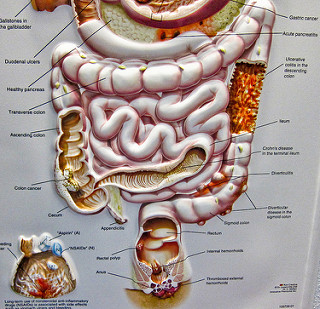In multiple sclerosis, constipation is a common symptom
 In multiple sclerosis (MS), constipation is a common symptom. A nuisance anyone can experience in their everyday life, constipation is yet another one in the spectrum of uncomfortable symptoms associated with MS. Multiple sclerosis patients often suffer from chronic constipation and may go for days just not feeling “right”.
In multiple sclerosis (MS), constipation is a common symptom. A nuisance anyone can experience in their everyday life, constipation is yet another one in the spectrum of uncomfortable symptoms associated with MS. Multiple sclerosis patients often suffer from chronic constipation and may go for days just not feeling “right”.
Constipation is described as having two or less bowel movements a week, feeling as if you have not fully emptied your bowels, straining to have a bowel movement, and having hard or lumpy stool.
Because constipation is often underreported, estimating how many multiple sclerosis patients are plagued by this common problem is hard. Underreporting may occur because patients don’t realize it is an MS symptom, they focus on more dramatic symptoms when speaking to their doctor, and may feel too embarrassed to discuss constipation. With these factors in mind, constipation is estimated to affect 50 to 70 percent of multiple sclerosis patients.
Causes of constipation in multiple sclerosis
In a healthy bowel movement, the stool is constantly moving through the intestines and contains sufficient amount of water. As stool passes through the intestines, it stops for some water absorption to become more solid. When the stool slows down for too long, too much water is absorbed. As a result, the stool becomes too hard to pass through the colon.
Constipation in multiple sclerosis can occur due to a number of factors, including neurological damage – the brain doesn’t transfer the proper signals to indicate you have to pass a bowel movement, limited physical activity, side effects of medication, and insufficient hydration.
Home remedies for managing constipation in multiple sclerosis
Here are some tips you can implement as a means of managing constipation in multiple sclerosis.
- Eat more fiber: sources of fiber include fruits, legumes, nuts, vegetables, and whole grains.
- Try bulking agents, which are powdered forms of fiber that you mix with water to help you quickly and easily bulk up on fiber.
- Drink plenty of water.
- Take part in regular exercise.
- Use a stool softener.
- Try laxatives once in a while – overuse of laxatives can lead to life-long problems.
- Create a routine where you schedule when you go to the bathroom – this may occur 20 to 30 minutes after each meal.
- Speak to your doctor about multiple sclerosis medications that may aid in constipation as well.
You should see your doctor about constipation is there is blood in your stool, if you experience unexplained weight loss, or if there is severe pain accompanying your bowel movement.
Related Reading:
Multiple sclerosis risk increases with shift work due to circadian rhythm and sleep pattern disruption
Multiple sclerosis (MS) risk increases with shift work due to circadian rhythm and sleep pattern disruption. The study came from Swedish researchers who uncovered an association between multiple sclerosis and shift work. Continue reading…
Multiple sclerosis vs. NMO, differences in symptoms, causes, and treatment
Multiple sclerosis and neuromyelitis optica (NMO) are often believed to be the same condition as they share many similarities. Both conditions are autoimmune. In multiple sclerosis, the immune system attacks the myelin, which is the protective coating around nerves. Continue reading…
-
Weight Loss Services - Laser Liposuction, Hcg Weight Loss From Weight Loss Clinic
Abnormal fat on body is the root cause of human diseases like diabet
-
How To Naturally Turn Your Slow Metabolism Into A Fast Fat Burning Machine
When Thanksgiving, Christmas, and other holidays come around where I e
-
Workout Mistakes in Fat burning Programs
Will you be making these common mistakes that always RUIN people’
-
Hoodia Gordonii Plant Terrible Facts You Ought To Know
Everyone has been hearing the news and buzz on the semi miraculous pla
-
Weight Loss Calculator: How Many Calories Do You Need?
If you are planning to lose weight then you should know how many calor
-
Your Diet Affects Your Health: How To Maintain Good Nutrition
One would think in this day and age that everyone would have the
- DON'T MISS
- Having Fun With Exercise
- 7 Things that Separate Weight-Loss Winners & Losers
- Thumbing Through Threatening Weight Loss Supplements
- Three Important Aspects To Losing Weight And Exercise
- How Much Weight Do You Want To Lose? We Will Show You How
- Get Rid Of Tummy Fat - 5 Things To Learn By Heart On How To Get Rid Of Tummy Fat
- Weight Loss Boot Camps Motivate You To Go The Extra Mile For Fitness
- Why Eating In Silence Can Help With Weight Loss & Stress
- 25 Tips To Loose Weight In An Effective Manner
- Learn How to Lose Belly Fat with Diet and Exercise




